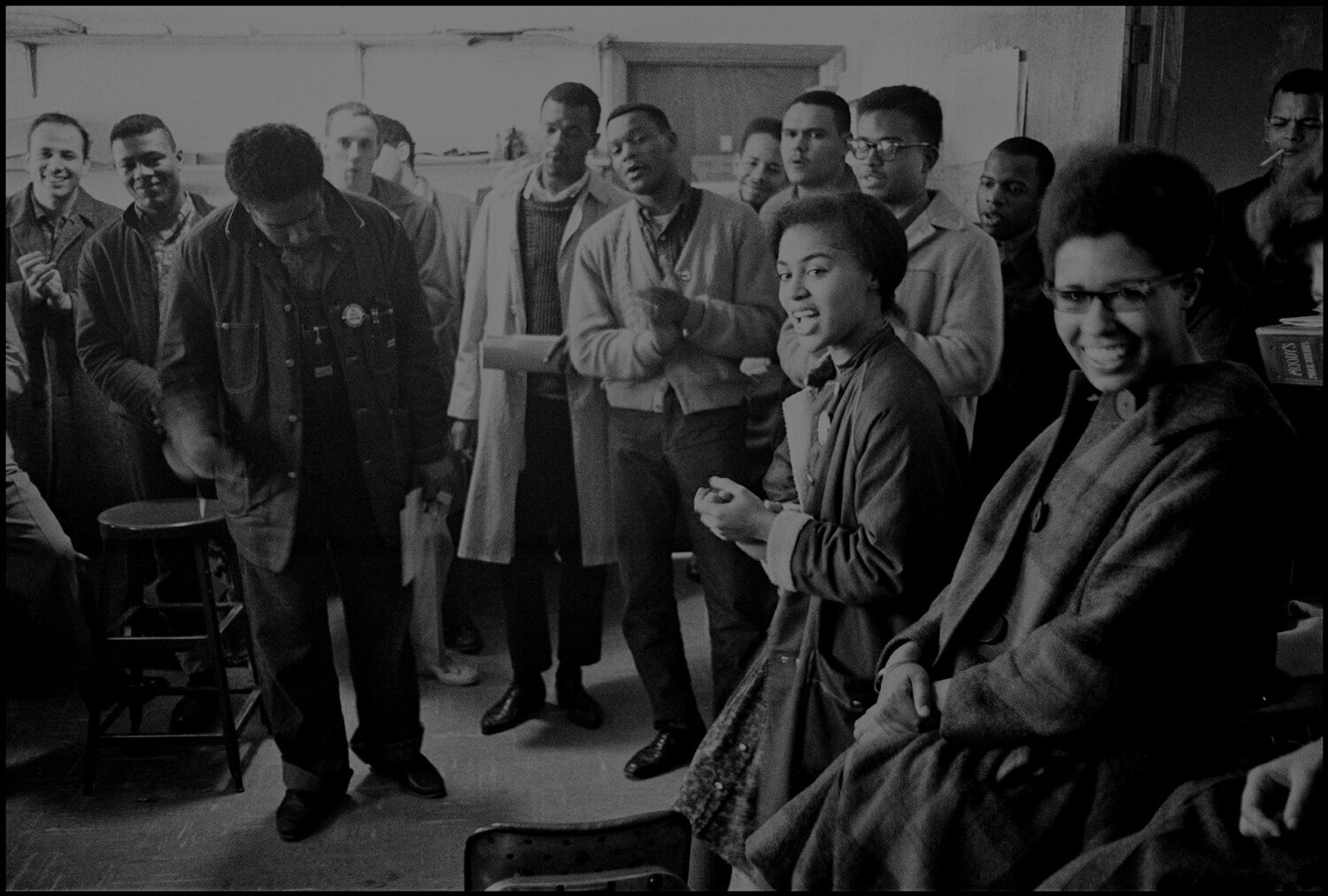
Address at SNCC Conference (1963)
A speech delivered by Ella Baker on December 1st, 1963.
I suppose it must be an indication of my growing old, I actually get affected by such applause. I almost lose my sense of balance and want to sort of act like a female and cry. I don't know whether that's good or bad for me.
I had not anticipated having anything to say, and I think it's very gracious of Jim [Forman] to not only call on me, but to indicate that what SNCC is, is the result of what the people are who are in SNCC. And SNCC if it is anything different from any of the rest of the groups that have come on the scene, I hope is different in two respects in particular: one is, it is concerned with not the development of a leader, but the development of leadership. And there's a lot of difference between the development of single individuals as leaders and the development of leadership, with leadership concepts, leadership goals, leadership methods that people can follow after we have moved on, and we must all move on from one point to the other.
I think it's different in that respect; it's also different in the respect that it goes into the hardcore areas and identifies very closely with people. It works with people. It lives with people. And it has had to do this especially in the areas where it worked, because there they found—and we all know this, if we hadn't known it, we should know it—that in order to get people in deep areas of the South to move, to even act in their own behalf, they have to first be given a feeling of confidence in you, and then this gives them the feeling of confidence so that they can break through the years of fear and suppression that they have experienced. And this I think SNCC has done a good pioneering job in, setting the pace for others to follow.
I think if we are to move forward, as we can move forward, we have to also combine that other thing that I hope will become very unique with us and which was conceived in the beginning, namely that we bring to bear on the problems of race, the problems of human suffering, not only our own emotional righteous indignation with the situation, but we use the full capacities of our thinking and our minds and others' minds to actually think through and to chart programs that people can respond to and programs that have basic effect on changing the system so people can live instead of just exist.
I wish that we had time tonight, not tonight, but certainly during the conference to analyze further that which Bob Moses set before us this morning. And if we don't do it now, we've got to do it as a staff, because we have reached the point that the old line methods of just getting out in a demonstration just for the sake of demonstrating is far from being enough. And we've got to find ways in which to involve people at many different levels. And we've got to find ways in which to evaluate our own selves in respect to the movement. Frequently we don't find time to look at ourselves. And this is one of the reasons why, today, when Mr. [James] Baldwin made the statement to the effect that the white man, in order to find his role in the movement, he would have to forget that he's white. I think we also have to forget that we are Negroes as such. But we forget that only in terms of not trying to feel that the white fellow who comes into our movement has to come by us. Now I can understand, as we grow in our own strength and as we flex our muscles of leadership, and flex our muscles that have come from seeing how effective we are, we can begin to feel that the other fellow should come through us. But this is not the way to create a new world. We can only create a new world out of a commonness of purpose and a decent respect for all the people who are helping to contribute to it.
I don't think we need to be afraid. Certainly we don't need to be afraid of being taken over, if we know where we're going, know why we are going there, and then know how we're going to get there.
I suppose if I'd wanted to speak, I could have been shorter. But since I didn't want to speak—no, I don't think I should, Jim, no, I got some other things we can talk about later—but maybe before the conference is over we can have an opportunity to talk some. But certainly we ought to begin to think very seriously about the directions in which we are going and assume the responsibility that has been laid on our shoulders as a result of the fact that, whether we like it or not, we have been able to pioneer in a direction that had not been pioneered before.
When you talked about a movement on Mississippi, you called it MOM. I remember those days. And I remember the fact that we didn't move on Mississippi when we thought we were going to move on Mississippi. But I also remember that you didn't forget to dream, that you didn't forget it, and that when Bob Moses went down into McComb, Mississippi, and inspired such people as Brenda Travis, who is here somewhere—I don't know whether she is here or not in the audience—but inspired the high school students of McComb, Mississippi. And when out of this came some other people, and when you began to come to the conferences, and no longer were there ten or twelve people who were on the staff, but there were twenty, and there were thirty, and then there's now over a hundred people, people who come to the staff because they feel it offers some opportunity to find some greater meaning in life, and an opportunity to help provide…
[break in tape]
He said, "I been wondering what keeps you going?" And afterwards I thought about it myself. What is it that keeps people who have been going as long as I have trying to keep going? I think one of the things that keeps one going is a faith in human beings. Basically I believe human beings want to live in a decent world. Basically I believe that the young people of today really are out to create that kind of world. And if I didn't believe that there would be no virtue in my living, because I cannot see any virtue even in using one's creative instinct, one's creative capacities, if we cannot create a world in which people can live, then we haven't done anything.
When I was much younger, I used to make speeches that were much better rounded, and one of them had to do with this subject: that to penetrate the mystery of life and to perfect the mastery of life were the twin goals of great living. At that time, and I suppose I can still say now, we have done much in the direction of penetrating the mystery of life. With all this equipment we have around us, it is part of the penetration of the mystery of life. And when we hear about the Telstar and all of the marvelous things of science—the computer machines and all of these things—this is part of the penetration of the mystery of life. But where we have failed, and failed so woefully, is the perfection of the mastery of life. And there can be no perfection of the mastery of life until we have learned that human beings are human beings worthy of the dignity and respect wherever they are, irrespective of who they are.
And as Jim Forman pointed out today, what we think of others, we can so easily become. And this is a danger for us. When we look at these irrational people, and we know they're irrational, when we see as I happened to have seen, about the 31st of October, four young white men who trailed us from Natchez, Mississippi, to Port Gibson, and then jumped out of their car and vented their spleen on Bruce Payne, a young graduate student at Yale University. Why did they find it necessary to do this? Why do they find it necessary to take out their venom on somebody else? Because somewhere, somehow, they have been fooled.
And you and I know a great deal of why they have been fooled. And they have been fooled and made to feel that they had something of value in being white. And then deep down inside of them they knew this was not true, that they knew that just being white was not enough, and so they are confused and they don't know where to turn. And so when we gaze upon these people, we gaze upon them not with a sense of despising them, or even rejecting them, or being overcritical of them, but being understanding of what has made them into what they are. And part of our task, as I see it, is to help them to see that they can be something other than that, and I don't know whether it comes through nonviolence or not, but it certainly comes through an understanding of your own value, so that you do not feel it necessary to lord it over somebody else just because you have the opportunity to do so. These things may be very elementary, but I think they are basic to what we become and how well we carry the torch that has been handed to us.
I am glad to see so many people in SNCC that I don't know them. But I do hope, that whoever we are, and wherever we are, that we will continue to think in terms of the fact that what we do in SNCC is not for the development of SNCC as a big, powerful organization, nor for getting headlines. But we do this because we believe that it is necessary to change the political and social system of Alabama, Georgia, Mississippi, and yes to change the political and social system in respect to the entire country. So that when we say we have a democratic country and when we claim that we're a nation for the people and by the people, it will truly be a people's nation and a people's government. And this can only be if the people themselves understand how valuable they are, and understand what it takes to become a nation of the people, for the people, and by the people. And we have the opportunity to help the people understand this, and understand it in a way and in a depth that we perhaps haven't even begun to find the final depth for. But I think this is an opportunity and I'm glad that I'm here tonight.
The three years from '60 to '63, out of my fifty-odd years, seems to me to be the best years of my life. I hope I have three more to be with you.
— Ella Baker, 1963.
[End of speech]
As printed in Houck, D.W., and Dixon, D.E. (Eds.) (2009). Women and the Civil Rights Movement, 1954-1965. Jackson, Miss.: University Press of Mississippi.
Address at SNCC Conference - Dec. 1963
Ella Baker
December 01, 1963— Washington, D.C.
Back to Ella Baker
Back to Table of contents

